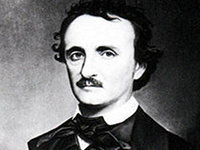Edgar Poe and the 'infantine imbecility' of American society
By Nicolas Bonnal

Some writers and bright minds that happen to criticize a little the great character of American civilization are brutally sentenced to silence and thus ignored by media conspiracies. Others, like Tocqueville, discover that America is a champion in the art of ignoring the critical mind: No writer, whatever be his eminence, can escape from this tribute of adulation.
Of course, many American geniuses, before this term was spoiled par mass culture and modern media, already had a very bad perception of their country. But it was far ago... The first great American writer, who was also a great reporter, is, of course, Edgar Allan Poe, always marginalized by Yankee school subculture (and you will soon understand why), who was deified by French writers like Mallarmé and his well-known translator Baudelaire, one of the inventors of modern poetry.
In two of his famous yet unread stories, the colloquy of Monos and Una and Some words with a mummy, Poe, an aristocratic soul bred in Britain in a southern spirit, settles his counts with America, modernity, democracy, plutocracy, progress and so on. He starts shyly with Monos and Una:
You will remember that one or two of the wise among our forefathers had ventured to doubt the propriety of the term "improvement," as applied to the progress of our civilization.
Then he insists more bravely, as if he were sure that he would be deprived of readers! Like many European great minds, Poe considers the renaissance and modern civilization as a disease:
Alas! We had fallen upon the most evil of all our evil days. The great "movement" --- that was the cant term --- went on: a diseased commotion, moral and physical. Art --- the Arts --- arose supreme, and, once enthroned, cast chains upon the intellect which had elevated them to power.
Our time is well-known too for its festive tone and its innumerable prides: here we go with Poe, who denounces this new age childishness:
Man, because he could not but acknowledge the majesty of Nature, fell into childish exultation at his acquired and still-increasing dominion over her elements. Even while he stalked a God in his own fancy, an infantine imbecility came over him.
Infantine imbecility! Who could too write such a horror, that the modern and democratic man is an infection, except a great American author? Read the map!
As might be supposed from the origin of his disorder, he grew infected with system, and with abstraction. He enwrapped himself in generalities. Among other odd ideas, that of universal equality gained ground; and in the face of analogy and of God --- in despite of the loud warning voice of the laws of gradation so visibly pervading all things in Earth and Heaven --- wild attempts at an omni-prevalent Democracy were made.
As later would write the great Lovecraft, Poe denounces the risks of this modernity intertwined with pollution and ugliness, both being the results of scientific knowledge. In a somewhat pompous and ironic style, Edgar Poe writes so:
Yet this evil sprang necessarily from the leading evil, Knowledge. Man could not both know and succumb. Meantime huge smoking cities arose, innumerable. Green leaves shrank before the hot breath of furnaces. The fair face of Nature was deformed as with the ravages of some loathsome disease.
The physical destruction of the world through the forces of capitalism and technical progress, the industrialization too of education, leads to the worst of horrors: the loss of taste.
But now it appears that we had worked out our own destruction in the perversion of our taste, or rather in the blind neglect of its culture in the schools.
This was for Monos and Una. But let's talk with the mummy!
When he meets an aristocratic figure in an Egyptian tomb, with an unpronounceable name, and whom he nicknamed humorously the count, Poe despises openly the technological level attained by America and the western civilisation:
I spoke of our gigantic mechanical forces.
He agreed that we knew something in that way, but inquired how I should have gone to work in getting up the imposts on the lintels of even the little palace at Carnac.
As if he knew that one day the Americans would have to choose between Obama and Romney, Edgar Poe minces no words while presenting us the seven wonders of the sacred unchallenged democracy:
We then spoke of the great beauty and importance of Democracy, and were at much trouble in impressing the Count with a due sense of the advantages we enjoyed in living where there was suffrage ad libitum, and no king.
The count tells the narrator a beautiful story that will remind us a more famous one. This time Poe is pitiless, proudly showing his great despise and his sophisticated irony.
Thirteen Egyptian provinces determined all at once to be free, and to set a magnificent example to the rest of mankind. They assembled their wise men, and concocted the most ingenious constitution it is possible to conceive. For a while they managed remarkably well; only their habit of bragging was prodigious. The thing ended, however, in the consolidation of the thirteen states, with some fifteen or twenty others, in the most odious and insupportable despotism that was ever heard of upon the face of the Earth. I asked what the name of the usurping tyrant was.
Now wait for the name of the tyrant!
As well as the Count could recollect, it was Mob.
Of course, like many great reactionary minds of his romantic and passionate time, Edgar Poe is fully opposed to any improvement, believing in more royal or medieval times. In this aspect he looks like Pushkin or Gogol, not to mention Hugo and less famous French authors. I humbly confess that sometimes the progress gets on my nerves, thanks to the greenhouse effects, airport's boutiques, fake elections and universal dumbness. Of course a gentleman must adapt his soul and manners to such miserable time (the American one). In conclusion, I think that nobody ever had better words about the progress than the count:
The Count merely said that Great Movements were awfully common things in his day, and as for Progress, it was at one time quite a nuisance, but it never progressed.
That's the point, dear reader: progress never progresses. Progress can't!
Nicolas Bonnal
Subscribe to Pravda.Ru Telegram channel, Facebook, RSS!





